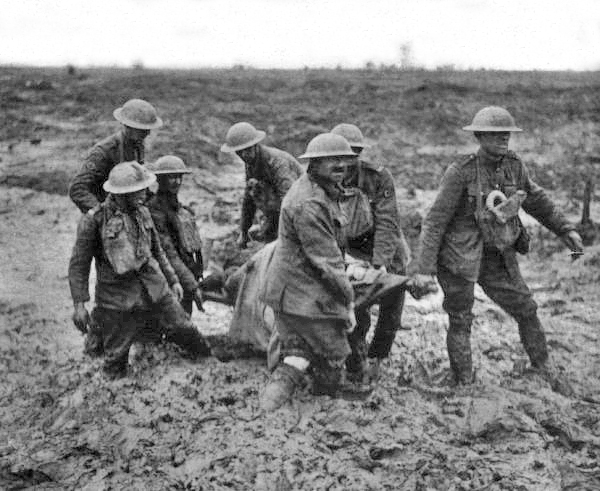Bible: Australia, England & Wales, India [optional], Ireland, New Zealand,
Pakistan, Scotland, South Africa)
The Jews then disputed among themselves, saying, “How can this man give us his flesh to eat?” So Jesus said to them, “Very truly, I tell you, unless you eat the flesh of the Son of Man and drink his blood, you have no life in you. Those who eat my flesh and drink my blood have eternal life, and I will raise them up on the last day; for my flesh is true food and my blood is true drink. Those who eat my flesh and drink my blood abide in me, and I in them. Just as the living Father sent me, and I live because of the Father, so whoever eats me will live because of me. This is the bread that came down from heaven, not like that which your ancestors ate, and they died. But the one who eats this bread will live forever.”
Mass in the Trenches, The Great War (1914-18)
Here is an account of the death of Fr Doyle, which took place in Belgium during the Battle of Passchendaele, also known as The Third Battle of Ypres, from the biography by Alfred O’Rahilly, a university professor who later became a priest:
the available room. An hour before Mass every inch of space was filled, even inside the altar rails and in the corridor, while numbers had to remain in the open. Word had in fact gone round about the Mass, and men from other battalions came to hear it, some having walked several miles from another village.
Before the Mass there was strenuous Confession-work. “We were kept hard at work
hearing confessions all the evening till nine o’clock” writes Fr. Doyle, “the sort of Confessions you would like, the real serious business, no nonsense and no trimmings. As I was leaving the village church, a big soldier stopped me to know, like our Gardiner Street [editor’s note: where the Jesuit church in Dublin is located] friend, ‘if the Fathers would be sittin’ any more that night.’ He was soon polished off, poor chap, and then insisted on escorting me home. He was one of my old boys, and having had a couple of glasses of beer — ‘It wouldn’t scratch the back of your throat, Father, that French stuff’ — was in the mood to be complimentary. ‘We miss you sorely, Father, in the battalion’, he said, ‘we do be always talking about you’. Then in a tone of great confidence: ‘Look, Father, there isn’t a man who wouldn’t give the whole of the world, if he had
it, for your little toe! That’s the truth’. The poor fellow meant well, but ‘the stuff that would not scratch his throat’ certainly helped his imagination and eloquence.
I reached the Convent a bit tired, intending to have a rest before Mass, but found a string of the boys awaiting my arrival, determined that they at least would not be left out in the cold. I was kept hard at it hearing Confessions till the stroke of twelve and seldom had a more fruitful or
consoling couple of hours’ work, the love of the little Babe of Bethlehem softening hearts which all the terrors of war had failed to touch.”
the whole congregation joining in the chorus. It was a curious contrast: the chapel packed with men and officers, almost strangely quiet and reverent (the nuns were particularly struck by this), praying .and singing most devoutly, while the big tears ran down many a rough cheek: outside the cannon boomed and the machine-guns spat out a hail of lead: peace and good will — hatred and bloodshed!
to make light of his injuries. Thank God, Father, he said, I am able to stick it out to the end. Is it not all for little Belgium? The Extreme Unction, as I have noticed time and again, eased his bodily pain. I am much better now and easier, God bless you, he said, as I left him to attend a dying man. He opened his eyes as I knelt beside him: Ah! Fr. Doyle, Fr. Doyle, he whispered faintly, and then motioned me to bend lower as if he had some message to give. As I did
so, he put his two arms round my neck and kissed me. It was all the poor fellow could do to show his gratitude that he had not been left to die alone and that he would have the consolation of receiving the Last Sacraments before he went to God. Sitting a little way off I saw a hideous bleeding object, a man with his face smashed by a shell, with one if not both eyes torn out. He raised his head as I spoke. Is that the priest? Thank God, I am all right now. I took his blood-covered hands in mine as I searched his face for some whole spot on which to anoint him. I think I know better now why Pilate said Behold the Man when he showed our Lord to the people.
God send me there to prepare him for death, for I had not long left the spot when a shell burst and killed him? I carried his body out the next day and buried him in a shell hole, and once again I blessed that protecting Hand which had shielded me from his fate.




